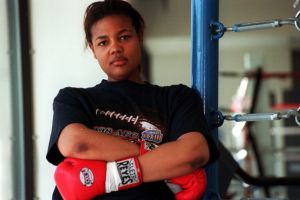Did Freeda Foreman Have CTE? Suicides By Black Women Are Rare
Did Freeda Foreman Have CTE? Black Women Rarely Commit Suicide

Source: Craig F. Walker / Getty
Freeda Foreman‘s family was mourning her untimely death just days after she was found having hanged herself. But the combination of her unexpected suicide and the fact that Black women very rarely take their own lives prompted speculation about the former female boxer: Is it possible that brain damage sustained in the ring led Foreman to kill herself?
See Also: UPDATE: Cause Of Death Is Revealed In Tragic Death Of Freeda Foreman
The 42-year-old daughter of boxing legend George Foreman was found dead on Saturday inside her Houston-area home. On Monday, investigators ruled her death a suicide.
It’s unclear at this point what prompted her to commit suicide. African-Americans have a low rate of suicide, according to the American Foundation For Suicide Prevention. In 2017, whites had the highest rate at 15.85 compared to Black people at just 6.61. Asian and Pacific Islanders had a slightly lower rate than African-Americans at 6.59.
Like her famous father, Freeda Foreman was a professional boxer, launching her career in 2000. Boxing is associated with Chronic Traumatic Encephalopathy (CTE), a progressive degenerative disease of the brain found in people with a history of repetitive brain trauma, according to Boston University CTE Center. The consequences of CTE include depression and suicide.
CTE has been known to affect boxers since the 1920’s when it was called punch drunk syndrome or dementia pugilistica. A definitive diagnosis of CTE can only be made after death when an autopsy can reveal whether the known brain changes of CTE are present.
In the ring, she was an imposing figure for a woman boxer, standing at 5 feet 11 inches tall, according to The Ring. She had a total of six professional fights and ended her career in 2001 with a 5 -1 record, which included three knockouts.
Foreman entered professional boxing at a time when the daughters of other famous 1970s heavyweight champions also joined the sport. Laila Ali, the daughter of Muhammad Ali, and Joe Frazier’s daughter Jacqui Frazier-Lyde competed professionally at the same time.
Foreman dreamed of fighting Laila Ali to avenge her father’s lost to Muhammad Ali in the ionic 1974 “Rumble in the Jungle” match.
Foreman recalled that her father did not want any of his children to follow in his footsteps.
“Dad never wanted any of his kids to see him fight. He always protected us from that world,” she said in a 2000 interview with the London Mirror. “With five brothers, there were plenty of fights at home. When Dad was home, we’d run around the house, play fighting and I’d beat up on my three younger brothers!”
Most studies on CTE have centered on football. Brain damage was believed to have played a role in the suicides of numerous players, including Junior Seau and Aaron Hernandez.
A 2012 study that focused on boxers showed that the sport takes a toll on the brain. The early research into CTE was a first step toward figuring out a breaking point for boxers to develop CTE. It’s unclear whether Foreman reached that threshold.
SEE ALSO:
‘We’re The Campbells’ Confronts Suicide Amid Worrying Statistics For Black Women
Watch TD Jakes Exorcise The ‘Spirit Of Suicide’ From Pastor John Gray
















